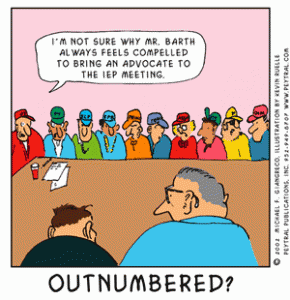How to Disagree with an IEP

Image source: eiwelcome.com
What is an IEP?
Your child’s Individualized Education Program (IEP) is a written document that details the services he will receive within the public school system under the Individuals with Disabilities Education Act (IDEA). You and a team of professionals will write the IEP during your IEP meeting.
Disagreeing With an IEP
Some disagreement is almost inevitable. You have the right to disagree with any part of the IEP (or all of it). Your child will not receive services from the public school system until you are satisfied with the IEP and have signed the document. However, you may want your child to receive some services while you are working to come to an agreement.
For example, the school may insist that your child receive one speech therapy session per week and you want him to receive three sessions. You have the option to sign the document and indicate in the parent addendum that your child requires three sessions. Indicate that you will accept one session for the time being while you pursue mediation or a formal complaint.
If you disagree with part of the IEP, be specific. For example, write “I (name), agree with the IEP except for sections 4 and 5.”

Image source: ipa.udel.edu
Procedural Safeguards
Obtain a copy of the school’s parents’ rights guidelines. These guidelines are typically referred to as procedural safeguards. The document describes the process of disagreeing with an IEP, from mediation to filing a complaint. The school should also provide you with information about legal representation.
Negotiation
The first step in working toward an agreement is typically informal negotiation. If at all possible, maintain a friendly, working relationship with the school’s staff. You’ll have to continue working with them throughout your child’s school years.
Try to reach a compromise that you feel serves your child’s best interests. If the team offers one speech therapy session per week, ask them to explain their position. Ask whether this complies with the IDEA law. If possible, point to a written document from your child’s private speech-language pathologist (SLP) that recommends three sessions per week. The school might compromise and offer two sessions or perhaps three shorter sessions. If you reach an agreement, get it in writing as soon as possible.
Mediation
It is your right to request mediation if you cannot reach an agreement. This is called due process. Filing an official complaint that requests a hearing may also be part of due process. During mediation, you and the team will meet with an impartial mediator to try to reach an agreement. You are not legally bound to accept the decision of the mediator. You may bring legal representation and you may also ask that the school pay for it, but they are not required to do so.

Image source: projectachieve.info
Filing a Complaint
File a complaint with your state’s Department of Education if mediation fails. Include your name, your child’s name, your contact information, and the school’s name and contact information. Include a description of the disagreement and request a hearing. Write your desired outcome, which includes the services and goals you want for your child, as well as reimbursement for evaluation costs, attorney fees, etc. Be as specific as possible; the state has the right to turn down your request on the grounds of insufficiency.
At the due process hearing, you must back up your arguments with solid evidence, which will likely be the private SLP’s evaluations of your child and his needs. You may subpoena witnesses. You will have the opportunity to present your side of the case. Tell the hearing officer exactly what your child’s speech disorder means for him. Discuss his needs and state that the school has failed to meet them. The exact procedure for a due process hearing will vary from state to state; consult your attorney for specific advice.


